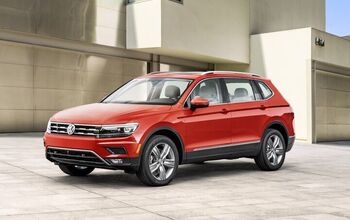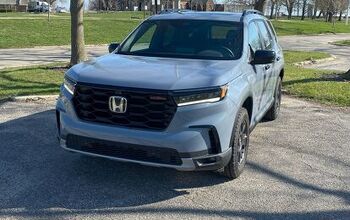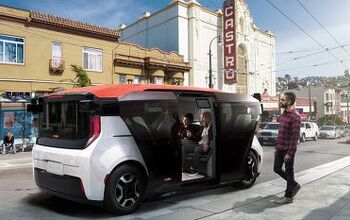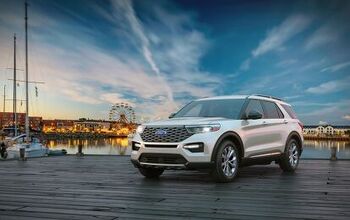Volkswagen Passat and Beetle Engine Lineups Altered for 2018 With Tiguan's 2.0T
Volkswagen of America confirmed last evening via email the alteration of the Passat and Beetle engine lineups for the 2018 model year.
In examining updated EPA mpg figures for the 2018 model year — as one does — we noticed a curious change. The 2018 Volkswagen Beetle Dune achieves slightly better highway fuel economy, 34 mpg, than the non-Dune 33-mpg 2018 Volkswagen Beetle.
By the by, after posing a handful of questions to Volkswagen of America spokesperson Mark Gillies, TTAC learned that the 1.8-liter turbocharged four-cylinder that served as the base engine in the Volkswagen Passat and Volkswagen Beetle from 2014-2017 is out. It gives way in the 2018 Passat and Beetle to the second-generation Tiguan’s EA888 Gen3B 2.0-liter turbocharged four-cylinder.
The result? Better fuel economy and more torque.
We knew the change was approaching, as Volkswagen told TTAC in late May that the Tiguan’s new Budack Cycle 2.0T, “will eventually supersede the 1.8T in the Passat and Beetle.” We did not know, however, that “eventually” meant immediately.
Meanwhile, the 1.8T continues apace in the Jetta and Golf.
You’ll recall that Volkswagen’s decision to swap out the old 2.5-liter five-cylinder drove Passat fuel economy up from a combined 25 miles per gallon to 28 miles per gallon. By 2017, the Passat 1.8T automatic was rated at 27 mpg combined. The new 2.0T is rated by the EPA at 29 mpg combined. In the Beetle, it also makes for a 29-mpg car (although Beetle Dunes do add that single mpg to the Beetle’s 33-mpg highway rating.)
But the real story will be seen in a different section of the spec sheet. If the Tiguan’s power figures hold, the Passat and Beetle will swap out a 170-horsepower; 184-lb-ft 1.8T that didn’t make peak power at 4,800 rpm and reached peak torque at 1,500 rpm. In its place will be a 2.0T with 184 horsepower (that arrives 400 rpm sooner) and 221 lb-ft of torque at 1,600 rpm.
It’s unlikely that a fuel economy uptick and a torque boost will turn the Passat and Beetle into barnstorming sales successes in 2018. This will be the Passat’s seventh model year. While Passat volume is better this year than last — when Volkswagen was feeling the full impact of a post-diesel emissions scandal collapse — sales are 36-percent lower in 2017 than they were in 2012.
Likewise, the Beetle is selling more often this year than last, but U.S. Beetle volume is 62-percent lower than it was in 2013.
No, the 2.0T won’t create instant sales successes. But we’re not going to complain about incremental fuel economy improvements that associate themselves with significant torque boosts.
Volkswagen will provide more spec and lineup details for the 2018 Beetle and Passat in the coming weeks.
[Images: Volkswagen]
Timothy Cain is a contributing analyst at The Truth About Cars and Autofocus.ca and the founder and former editor of GoodCarBadCar.net. Follow on Twitter @timcaincars.
More by Timothy Cain
Latest Car Reviews
Read moreLatest Product Reviews
Read moreRecent Comments
- Mike Wasnt even a 60/40 vote. Thats really i teresting.....
- SCE to AUX "discounts don’t usually come without terms attached"[list][*]How about: "discounts usually have terms attached"?[/*][/list]"Any configurations not listed in that list are not eligible for discounts"[list][*]How about "the list contains the only eligible configurations"?[/*][/list]Interesting conquest list - smart move.
- 1995 SC Milking this story, arent you?
- ToolGuy "Nothing is greater than the original. Same goes for original Ford Parts. They’re the parts we built to build your Ford. Anything else is imitation."
- Slavuta I don't know how they calc this. My newest cars are 2017 and 2019, 40 and 45K. Both needed tires at 30K+, OEM tires are now don't last too long. This is $1000 in average (may be less). Brakes DYI, filters, oil, wipers. I would say, under $1500 under 45K miles. But with the new tires that will last 60K, new brakes, this sum could be less in the next 40K miles.




































Comments
Join the conversation
Car and driver has this info in their current edition, so the change was known many weeks ago.
Passat has to be one of the most underrated cars on the market. It feels substantial to drive and has a well put together interior, not to mention both the trunk and trunk opening are properly huge.